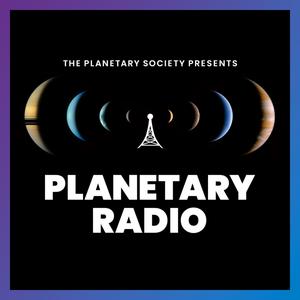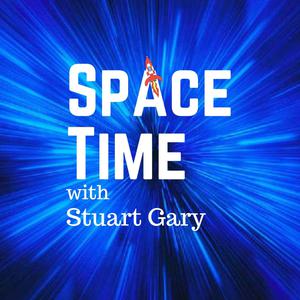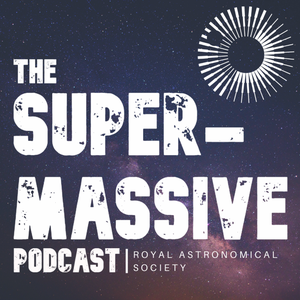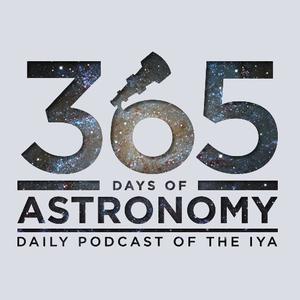
Planetary Radio: Space Exploration, Astronomy and Science
The Planetary Society
Planetary Radio brings you the human adventure across our Solar System and beyond. We visit each week with the scientists, engineers, leaders, advocates, and astronauts who are taking us across the final frontier. Regular features raise your space IQ while they put a smile on your face. Join host Sarah Al-Ahmed and Planetary Society colleagues including Bill Nye the Science Guy and Bruce Betts as they dive deep into space science and exploration. The monthly Space Policy Edition takes you inside the DC beltway where the future of the US space program hangs in the balance. Visit planetary.org/radio for an episode guide and much more.
- 56 minutes 52 secondsDoes It Fly? Putting science in entertainment to the test
This week, we discuss how to examine the science behind our favorite TV shows and movies with the co-hosts of the "Does It Fly?" podcast, Hakeem Oluseyi and Tamara Krinsky. Produced by Roddenberry Entertainment, "Does It Fly?" takes an expert approach to breaking down the science of popular media, from lightsabers to Dune's stillsuits. Hakeem brings his astrophysics expertise, while Tamara provides her media industry insights as they join Planetary Radio to explore where science and fiction intersect. Stick around for What's Up with Bruce Betts and this week's Random Space Fact.
Discover more at: https://www.planetary.org/planetary-radio/2025-does-it-fly
See omnystudio.com/listener for privacy information.
22 January 2025, 4:00 pm - 51 minutes 28 secondsRevisiting K2-18 b: JWST finds a lead in the search for life on a mysterious exoplanet
This week we revisit one of the most remarkable exoplanet discoveries of 2024 with the help of the James Webb Space Telescope (JWST). JWST detected signs of methane and carbon dioxide in the atmosphere of K2-18 b. Knicole Colón, the deputy project scientist for exoplanet science for JWST, explains how this discovery could reshape our search for life beyond Earth and teach us more about the enigmatic class of exoplanets known as sub-Neptunes. Stick around for What's Up with Bruce Betts, the chief scientist of The Planetary Society.
Discover more at: https://www.planetary.org/planetary-radio/2025-jwst-new-lead-in-search-for-life
See omnystudio.com/listener for privacy information.
15 January 2025, 4:00 pm - 55 minutes 41 secondsEmily Calandrelli becomes the hundredth woman in space
This week, we celebrate a remarkable milestone as Emily Calandrelli, also known as “the Space Gal,” becomes the 100th woman to venture into space. Emily shares her experiences on the Blue Origin voyage, what she took to space, and how motherhood influenced her reaction to seeing Earth from space. Then Planetary Society Chief Scientist Bruce Betts joins for What's Up and a list of fun things to do in zero-g.
Discover more at: https://www.planetary.org/planetary-radio/2025-100th-woman-in-space
See omnystudio.com/listener for privacy information.
8 January 2025, 4:00 pm - 1 hour 8 minutesSpace Policy Edition: The Challenges of Change at NASA
How does change happen within NASA, and what prevents it? Marcia Smith, founder of Space Policy Online, joins the show to discuss the opportunities and pitfalls faced by incoming presidential administrations and how NASA has—and hasn’t—changed over the decades. Will Artemis be reimagined? Will public-private partnerships introduce more risk than reward? And is change even the right default attitude to take?
Discover more at: https://www.planetary.org/planetary-radio/change-and-continuity-at-nasa-with-marcia-smith
See omnystudio.com/listener for privacy information.
3 January 2025, 4:00 pm - 52 minutes 37 secondsThe Planetary Society’s 45th anniversary with Bill Nye
Planetary Radio kicks off The Planetary Society's 45th anniversary year with CEO, Bill Nye. Bill reflects on the organization's first forty-five years and what humanity has learned about space in that time. Then, Chief Scientist Bruce Betts joins in for the first What's Up and Random Space Fact of 2025.
Discover more at: https://www.planetary.org/planetary-radio/2025-45th-anniversary
See omnystudio.com/listener for privacy information.
1 January 2025, 4:00 pm - 59 minutes 48 secondsLooking back on 2024
The Planetary Society team reviews the best space moments of 2024, from the China National Space Administration's return of samples from the far side of the Moon to the triumphant launch of NASA's Europa Clipper mission. Kate Howells (Public Education Specialist) shares the winners of The Planetary Society's Best of 2024 awards. Then, Mat Kaplan (Senior Communications Advisor), Ambre Trujillo (Digital Community Manager), and Asa Stahl (Science Editor) team up for a rundown of the year's highlights. We close out 2024 with Bruce Betts, our chief scientist, as he shares his last random space fact of the year.
Discover more at: https://www.planetary.org/planetary-radio/2024-looking-back
See omnystudio.com/listener for privacy information.
25 December 2024, 4:00 pm - 59 minutes 59 secondsMars “spiders” recreated in the lab
Lauren Mc Keown, a postdoctoral fellow at NASA's Jet Propulsion Laboratory, discusses her experiences recreating Martian araneiform terrain, also called Mars spiders, in the lab. Latif Nasser, the co-host of Radiolab, also joins Planetary Radio to share how you can cast your vote to name a quasi-Moon of Earth. Then Bruce Betts, chief scientist of The Planetary Society, looks at a different type of seasonal feature on Mars, recurring slope lineae, in What’s Up.
Discover more at: https://www.planetary.org/planetary-radio/2024-mars-spiders
See omnystudio.com/listener for privacy information.
18 December 2024, 4:00 pm - 47 minutes 5 secondsSpace Policy Edition: The Myth of Presidential Leadership
For over half a century, space advocates and presidents alike have tried to recreate the JFK moment of calling on the country to send a man to Moon — but is this a mistake? The classic book Spaceflight and the Myth of Presidential Leadership argued that it is, and by focusing on presidential power alone advocates set up these initiatives to fail.
However, in the decades since its publication, presidential authority has dramatically expanded. In this episode, we examine this tension: Did the success of Apollo create a false expectation about the role of presidential leadership in spaceflight? How can a president most effectively set new long-term goals for NASA?
Discover more at: https://www.planetary.org/planetary-radio/myth-of-presidential-leadership
See omnystudio.com/listener for privacy information.
13 December 2024, 4:00 pm - 58 minutes 24 secondsStarTalk with Bill Nye and Neil deGrasse Tyson
We take you to Planetary Society headquarters, where Neil deGrasse Tyson, astrophysicist and host of StarTalk, interviews Planetary Society CEO Bill Nye about the organization's 45-year history of empowering the world's citizens to advance space science and exploration. Then, we share an update on the incoming Trump administration's proposed pick for the next NASA Administrator, Jared Isaacman. Planetary Society Chief of Space Policy, Casey Dreier, and Director of Government Relations, Jack Kiraly, give us the details. We close out with Bruce Betts as he discusses the Van Allen belts and shares a new random space fact in What's Up.
Discover more at: https://www.planetary.org/planetary-radio/2024-startalk
See omnystudio.com/listener for privacy information.
11 December 2024, 4:00 pm - 59 minutes 45 secondsA hundred weeks in space exploration
Sarah Al-Ahmed, the host of Planetary Radio, marks her 100th episode with a look back at the defining moments of the past 100 weeks of space exploration. We'll revisit previous Planetary Radio interviews, including the launch of ESA's Juice mission to the icy moons of Jupiter with project scientist Olivier Witasse. Danny Glavin, the co-investigator for NASA's OSIRIS-REx, shares his thoughts after the triumphant return of samples from asteroid Bennu. Lindy Elkins-Tanton, principal investigator for NASA's Psyche mission, reflects on her team's mission to explore a metallic asteroid. Then, Bob Pappalardo, project scientist for Europa Clipper, discusses the mission's intense brush with Hurricane Milton before blasting off to unlock the secrets of a potentially habitable ocean world. We close out the show with Bruce Betts, the chief scientist of The Planetary Society, for What's Up.
Discover more at: https://www.planetary.org/planetary-radio/2024-one-hundred-weeks
See omnystudio.com/listener for privacy information.
4 December 2024, 4:00 pm - 54 minutes 31 secondsSeven worlds, one mission: The United Arab Emirates aims for the asteroid belt
The United Arab Emirates Space Agency is working on its next ambitious spacecraft, the Emirates Mission to the Asteroid Belt. It will visit seven asteroids, ultimately rendezvousing with Justitia, the reddest object in the main asteroid belt. We'll get an update on their team's progress from Mohsen Al Awadhi and Hoor Al Hazmi, the director and science team lead for the Emirates Mission to the Asteroid Belt. Then, our chief scientist at The Planetary Society, Bruce Betts, joins host Sarah Al-Ahmed for What's Up and a new random space fact.
Discover more at: https://www.planetary.org/planetary-radio/2024-uae-asteroid-belt
See omnystudio.com/listener for privacy information.
27 November 2024, 4:00 pm - More Episodes? Get the App
Your feedback is valuable to us. Should you encounter any bugs, glitches, lack of functionality or other problems, please email us on [email protected] or join Moon.FM Telegram Group where you can talk directly to the dev team who are happy to answer any queries.
 Space Nuts
Space Nuts
 SpaceTime with Stuart Gary
SpaceTime with Stuart Gary
 The Supermassive Podcast
The Supermassive Podcast
 Astronomy Cast
Astronomy Cast
 The 365 Days of Astronomy
The 365 Days of Astronomy
 Universe Today Podcast
Universe Today Podcast